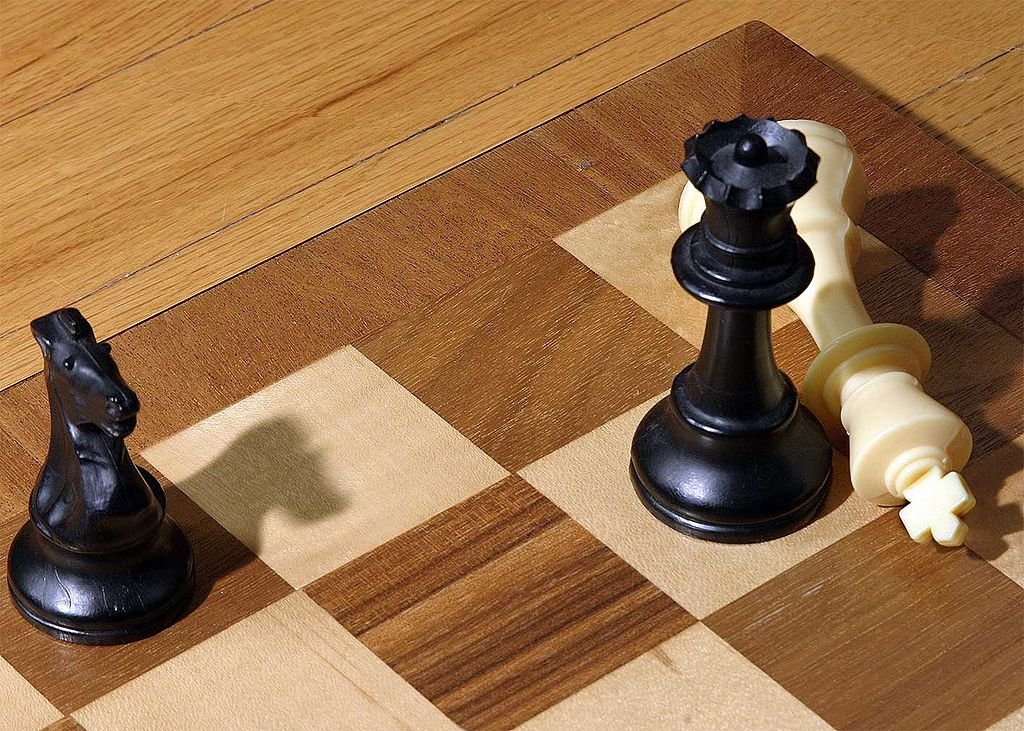24 August 2022
Mate is actually two distinct words, one referring to a companion and the other referring to a winning move in the game of chess. Both entered into English at about the same time, but from very different sources.
The companion sense of mate comes from the Middle Low German mat (comrade). It’s based on the same Germanic root as the word meat (food, later more specifically flesh), so a mate is a literally a companion at table. This mate appears in English in the late fourteenth century, although there is an older form of the word.
That older form is mette, found in Old English and in Middle English as late as c.1400 in poem Piers Plowman, but that form gave way to the borrowing from Middle Low German. The borrowed mate is recorded by c.1380 in the romance Sir Ferumbras. In the passage, Floripas, the sister of the title character, speaks to her chamberlain, Maumecet:
& Flo[rippe] þat was þanne þer ate; turnþ hure in faire aȝe,
& sayde: “Maumecet my mate; y-blessed mot þou be
For aled þow hast muche debate; to-ward þys barnee.”(& Floripas who was there, she turned in affectionate respect,
& said, “Maumecet, my mate, you must be blessed
For you have alleviated much disagreement within this retinue.”)
In addition to generally meaning a companion, mate is also used as a title on board ship. This nautical sense is recorded about a century after the general sense appears in English. From a record of payments, c.1485, found in the papers of the Cely family:
Item I p[aid] to the bottswhwayn and hys matte at Sandwyche . . . . . 2s.
(Item #1: paid to the boatswain and his mate at Sandwich . . . . . 2 shillings.)
And of course, a mate can be one’s spouse or cohabitating companion or one of a breeding pair of animals. This sense comes even later, recorded in the mid sixteenth century in a 1549 sermon by Hugh Latimer, former bishop of Worcester and then chaplain to King Edward VI, the teenaged son of Henry VIII. The passage in question is about finding a wife for the young king:
Therfore let oure kynge, what tyme hys grace shalbe so mynded to take a wyfe, to chose hym one, whych is of God, that is, whyche is of the houshoulde of fayth. Yea let all estates be no les circumspect in chosyng her, taking greate deliberacion, and then shall not nede dyuorsementes, and suche myscheues, to the euyl example and slaunder of our realme, and that she be one as the kynge can fynd in hys hert to loue and lede hys lyfe in pure and chaste esposage, and then shall he be the more prone and redy to aduaūce gods glory, punishe and extirpe, the greate lecherye vsed in thys realme. Therefore we oughte to make a continuall prayer vnto God, for to graunte our kynges grace such a mate as maye knyt hys herte and hers, accordynge to Goddes ordinaunce and law.
The chess term, however, has a very different history. It ultimately comes from the from the Persian mata (to die) or shah mat (the king has died; checkmate). It passed into the Arabic sha mat and thence into European languages. From there the trail gets muddied because chess was so widely played throughout Europe. The English chess term is certainly heavily influenced by Anglo-Norman and continental French usage, but there are undoubtedly influences from other European languages as well. And in fact, we have an example of Anglo-Latin use from the late eleventh century in a poem about the game:
Si non habet ubi pergat. Scacha mattum audiat.
(If he has nowhere to go, he hears check mate.)
But despite the fact that the chess term was circulating in Anglo-Latin and Anglo-French much earlier, the earliest recorded instance of it being used in English is in the poem Of Arthour and Merlin, copied c.1330 but probably composed sometime before 1300. The poem uses the chess term to describe the outcome of a battle:
Naciens, Adrageins & ek Herui
VI heþen kinges driuen hardi
Þat hete Mautaile & Fernicans,
Bantrines & Kehamans,
Forcoars & Troimadac,
For to ȝeuen hem her mat.(Naciens, Adragiens, and also Hervi
Drove hard six heathen kings
That were named Mautaile and Fernicans,
Bantrines and Kehamans,
Forcoars & Troimadac,
In order to give them their mate.)
So, there you have it. A rather simple word with a bifurcated and complex history.
Sources:
American Heritage Dictionary, fifth edition, 2015, s.v. checkmate, tr.v. and n., mate, n.2.
Of Arthour and Merlin. Edinburgh, National Library of Scotland, Adv. MS 19.2.1, fol. 254rb (Auchinleck Manuscript).
Herrtage, Sidney, ed. The English Charlemagne Romances, Part I, Sir Ferumbras. Early English Text Society, Extra Series 34. London: Trübner, 1879, lines 1371–73, 50. HathiTrust Digital Archive. Oxford, Bodleian Library, MS Ashmole 33.
Latimer, Hugh, The Fyrste Sermon of Mayster Hughe Latimer. London: John Day, 1549, sig. C4v–C5r. Early English Books Online (EEBO).
Malden, Henry Elliot, ed. The Cely Papers. London: Longmans, Green, 1900, 176. HathiTrust Digital Archive.
Middle English Dictionary, 2019, s.v. mate, n., mat, interj. & n., mette, n.
Oxford English Dictionary, third edition, March 2001, s.v. mate, n.1 and int., mate, n.2.; December 2001, s.v. mette, n.; second edition, 1989, checkmate, int. and n.
“Winchester Poem.” In H.J.R. Murray. A History of Chess. Oxford: Clarendon Press, 1913, 515. Google Books. Oxford, Bodleian Library, MS Auct. F.2.14, fol. 110v.
Photo credit: Alan Light, 2004, licensed under a Creative Commons Attribution-Share Alike 3.0 Unported license.

